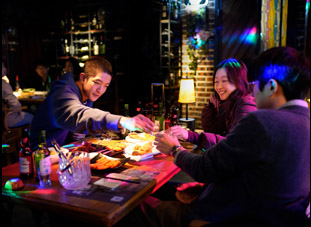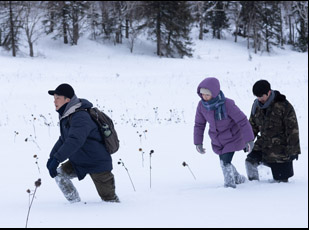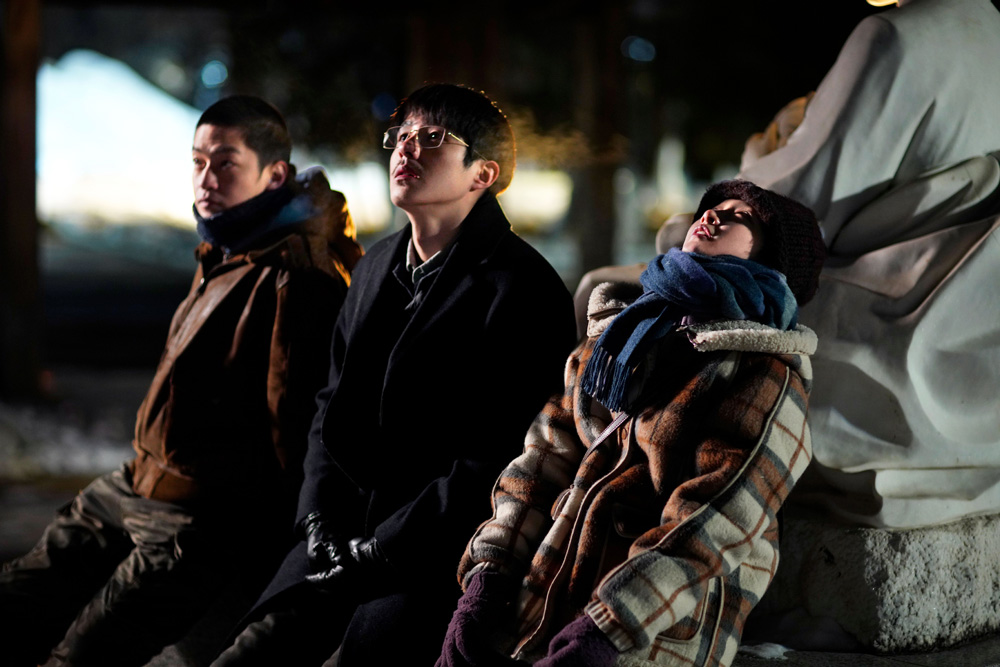If there’s a crisp feeling in the air from the very start of “The Breaking Ice,” it stems from the breeze that Anthony Chen surely felt was at his back in getting back into the open after emerging from the pandemic in an entirely different world than the one he had become a rising star in. After his second feature “Wet Season” confirmed the promise of his tender debut “Ilo Ito,” the director had been poised for major things, but was left unsure in 2020 whether he’d ever be able to make the kinds of intimate and meticulously crafted dramas that he had perfected a process for when the idea of returning to a film set wasn’t only unimaginable but changes in the industry suggested he might not ever make his way back there even once it was deemed safe to do so.
Both in front of the camera and behind it, Chen took such feelings of desperation and turned them into the room to breathe as he tells a story of surrender, tracking three Chinese expatriates in South Korea that find comfort in one another during a particularly chilly winter. The film follows Li Haofang (Liu Haoran), who is brought to the country as a wedding guest and sneaks out of the nuptials upon learning there’s a tour bus that will take him into the mountains to do some sightseeing while he’s across the border. He may be underwhelmed when hitting the traditional tourist attractions, but the tour guide Nana (Zhou Dongyu) picks up on his loneliness, suffering herself from a similar melancholy and brings along Han Xiao (Qu Chuxiao), who like her has little to cling onto when working odd jobs, to take Li on the path less traveled. The three start to let go of their inhibitions in each other’s company, something that was happening off-screen as well when Chen loosened his grip on the creative process where he leaned more on his actors and their often breathtaking surroundings to create the same sense of connection for an audience as the characters were experiencing.
The result is more refreshing than even Chen probably could’ve imagined, capturing that elusive feeling of both self-discovery and having one’s faith restored in other people as the director simultaneously distinguishes himself further as an auteur and yet reaps the benefits from a greater degree of collaboration. “The Breaking Ice” is just one of two films Chen has out this winter, as his Greece-set drama “Drift,” starring Cynthia Erivo, is soon to arrive in theaters after its Sundance bow last year and after reaching a point in which he thought he might not direct again, Chen spoke about renewing his passion for cinema and channeling it into his latest work, setting up a production that could be continually surprising and the excitement of now seeing the film cross so many borders.

This is what I call a post-pandemic film. I was so miserable and depressed, going through a real existential crisis during the pandemic and and I came out of it really wanting to make a film. There was so much pent-up energy and frustration that I needed to unleash and when you’re lost and stuck, I don’t think the way forward is to go back to your old ways. So I was trying to get out of my comfort zone to find a new way of making films, which is why it was intentional that I didn’t shoot this back home in Singapore. It’s a tropical country that’s 75 to 90 degrees all year round, so I decided I’m going to make a winter film in a place I’ve never been to before, and I took my producing partner to the coldest place in China to do it. It was [typically] minus four to minus 20 degrees, but I think every decision on this film was about putting myself [in a situation] where I don’t feel completely safe, trying to get [me] out of my element.
Did you actually take a bus tour yourself or something like the one in the film to find the right locations?
What was interesting is the furthest north I’ve been is Beijing. I’ve never been into the Northeast and I knew if we wanted to shoot proper winter, we had to go far far north, so I literally looked at Google Maps when I was writing the script, and in the third act, I wanted them to go to a space of natural beauty, back to a [place of] certain purity without the urban environment. I found the Changbai Mountain [range], half of which is in North Korea and half is in China, so the border literally divides this mountain and it was during the pandemic when [to enter the country] I had to do a 21-day quarantine in Shanghai [after] my producer and I flew there. We hiked up the mountain and I saw for the first time Heaven Lake [a volcanic crater lake between the two countries], which I captured in the film, and I was so moved by it. There was something really powerful and so cleansing about that moment, and I knew this is where I’m going to set the end of the film.
But then I went back to the maps again, I was looking at the neighboring cities because [the story] needed to be logical and it needed to be near enough that they could drive towards this mountain. All the [surrounding] cities felt a bit generic, but I found a city called Yanji which is where we shot the film and [in fact] we joined a minibus tour with a tour guide for a couple of days and everything I saw found its way into the script. What was what was amazing and what was so fascinating was that I’ve never been to a Chinese city where still in China, but it doesn’t feel like China. It feels so surreal because even though the population are all Chinese citizens, half of them are Korean and they speak Korean, so [the area] was still of Korean culture and influence and when you go to the bars and clubs, it was playing K-Pop. Road signs and the buildings [would have markers] in Chinese, but it was also in Korean and [when] you’re talking about three young people who are lost in their lives, literally on the border of their lives, this very dreamlike, surreal city is the perfect setting for the film.

I had only like a two-page treatment when I started casting. I started writing the script when I was doing my quarantine in a hotel in Shanghai, and when I rang up the actors, I told them the story, but I didn’t have a lot of the details of what actually goes on in it. They were very generous and I think it was easier to try and get actors during the pandemic because they were not so booked up and they were feeling adventurous. Everyone just wanted to try something new and I remember I finished the script 10 days before production at 8 am and [the crew] were trying to make copies of it [because] the actors arrived in North Yanji at 3 p.m. in the afternoon and we did a table read at 7 pm. [Up until then], my crew [would spend the] day prepping and we were looking at locations, talking about design and at night, I’d be furiously writing until about 4 or 5 In the morning. I remember the assistant director constantly knocking on my door, [like] “Anthony, we need the script,” and [our table read] was the first time all the head of departments and actors read it for the first time. It was the first time I read my own script from the start to the end because I was furiously trying to get it to the end. I still remember the [director of photography] after this table read [saying], “Oh, this film is actually quite poetic and moving. It’s so special. I’ve never seen a Chinese film like that.” And then it was all of us wanting to bring this alive to the screen, and it was very very fresh for the actors, [who] were very well known in China, but they’ve never really none of them have really done an indie film before, so it felt like a real experience for them.

I cast it before I had all the details, but I had a very good idea about the background of these three characters. I first worked with the actress Zhou Dongyu on the short film during the pandemic [for] this film that Neon put together, “The Year of the Everlasting Storm” and I cast her in this film but I had to do it remotely because China was completely closed at a time and I was directing her via Zoom from London. We connected the camera to to a live stream and then I would be looking at the camera on my iPad and I would be directing [everyone] via Zoom. It was very stressful, but it turned out really well and we wanted to work together again in person, so she was the first one cast [in “The Breaking Ice”] and then I wanted to cast two actors who felt different in personality, so we’d have sort of the nerdy, goody two shoes and this cool, swath-looking young man, but I had no idea if they would work together as a trio.
When we all flew into the city and we started doing costumes and we put them together, I [thought] these three people look so good together and when we started shooting the first day, I think all of us were proud of the fact that we’ve managed to make this casting work because this film isn’t that heavy on plot. There’s so much where there’s so much nuance and so much subtext that’s carried by the performance of the actors that even as I was in post [production] cutting the film, I got so excited every time we’ve got scenes with the three of them together. You feel like you want to join on this journey and I think what was special about this project was that no one brought any baggage or judgment into this. Even though what you’re seeing is three young people on screen, I feel like it was four of us, [including] me off-screen going on this adventure to make a film that I’ve never made before trying to find new things in my process. I had the happiest time making this film. In the day, we would be shooting and they’d be playing in the snow and then at night, it was like what’s in the film [where we’d be] checking out new places for food. We’d be drinking. We’ll be enjoying ourselves and and there was such a such a chemistry.

I think you’re right. I’ve not used music in my first film “Ilo Ilo” or my second, “Wet Season,” but when I was writing the script, I knew I needed music in this film and and I brought on a composer very early. I knew I wanted a young person, someone that hasn’t been polluted by how a score should work in on film, so it was a musician that I found on Spotify who was also from Singapore, Kin Leonn. He was very young when we worked together on this film, only 26 I think, and I brought him on even as I was writing the script. I was shooting and cutting the film at the same time, so I’d be shooting during the day, and at the end of the day, the rushes would be sent to my editor in London and she would be cutting scenes together and these scenes would go to [the composer] and we were writing music as I was shooting, so in a way, a lot of his music has inspired me when I was shooting the film.
There was something really quite magical and collaborative here because I felt a lot of times the picture and the music join together really beautifully in this film and because he was writing music as I was shooting, about two days after the last day of [shooting], we had a first assembly of 80% with the music already written. We haven’t quite changed a lot of it [since]. There were small notes, but he’s got very very good instincts and being a young person in his 20s, I think he was the right person to capture that feeling of youth and the very complex emotions of what this generation is feeling. It’s the first time he scored a feature film and for me it was taking a lot of risks as well [where] I was hiring people that I never worked with before. But it worked so well. He’s just incredibly sensitive and talented and I thought the music actually helped to express a lot of the unsaid emotions in the film.

It’s been great. In fact, the day we premiered at Cannes was exactly 10 years to the day from my first film “Ilo Ilo” [did] and it was on the Sunday when we premiered this film. So it was very special and what was interesting is usually when you make an arthouse film that plays at a major festival, it’s an older cinephile crowd, but this film has been quite special in a lot of places [where] you’ve got a lot of young people that have come to the screenings and they would tell me, “I’ve never seen a film in recent years that I connect with so deeply.” There are people who feel healed by the film in a certain way [where they tell me] “I’ve been feeling unhappy for a couple of years now and something about this film spoke to me,” and that for me has been really special.
When I saw it for the first time, it just felt like exhaling. And I sense it was the same for you when it really does feel like a new direction while keeping what was special about your previous work.
That’s that’s good to hear because there are I think there are a lot of people who know my work, and I think they were a little bit shocked when they watch this film because my films used to be naturalistic [and rooted in] social realism. All of a sudden, it’s like “There’s music and there’s slow motion in this film. What is this? This is something else.” But what was so special about this film is that it allowed me to explore a lot of possibilities and the biggest lesson I learned is that in order for you to find new things, you need to learn to let go of other things. That was my process on this film. I was being very open and collaborative and wasn’t constantly bringing judgment and baggage into [the production] like it needs to be like that. I was opening my eyes to what what was before me.
“The Breaking Ice” will open on January 19th in New York at the IFC Center and January 26th in Los Angeles at the Laemmle Royal before expanding across the country.




